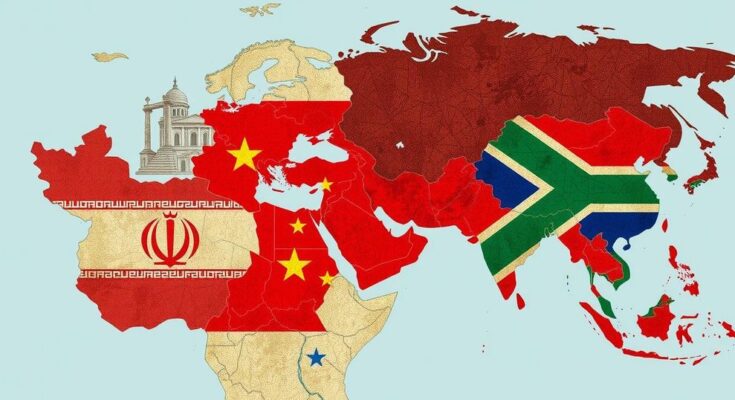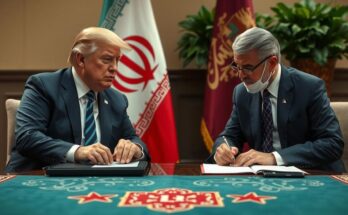Iran’s rial has hit a record low amid significant crises as neighboring conflicts worsen. In China, the government has expanded visa-free travel for tourists to bolster its economy post-COVID-19. South Africa’s closure of informal shops follows health crises linked to pesticide-tainted food. Russia’s arrest of a suspect in a military assassination brings attention to the ongoing war with Ukraine, marking critical international developments.
Iran is currently experiencing unprecedented hardships, notably marked by the devaluation of its currency, the rial, which has fallen to an alarming rate of 777,000 per dollar—the lowest recorded level. This economic decline is exacerbated by significant geopolitical changes, including setbacks in Syria and the impacts of conflict with Israel regarding its ally, Hezbollah. As Iran grapples with an energy crisis leading to the closure of schools and government offices, the nation faces a multifaceted crisis that has severely affected its populace.
In efforts to revitalize its tourism industry, China has implemented an extension of visa-free travel to 10 days for citizens from 50 selected countries, including the United States. Additionally, travelers from nearly 40 other nations will benefit from a visa-free stay of up to a month. Following the easing of COVID-19 restrictions, tourist arrivals have surged remarkably—an 86% increase, resulting in nearly 30 million visitors within the first eleven months of this year alone. These initiatives highlight China’s commitment to rebounding its tourism sector.
The South African government has taken serious measures by closing 1,041 informal grocery stores, commonly known as “spaza shops,” following tragic incidents of children consuming tainted food that contained harmful pesticides. The closure of these establishments serves as a crucial response to safeguard public health in response to prior incidents of illness and fatalities linked to the consumption of contaminated food products, emphasizing the government’s obligation to control food safety standards.
In Russia, authorities have apprehended a suspect in the assassination of Lieutenant General Igor Kirillov, a prominent figure in the military. The man, of Uzbek nationality, has been accused of receiving $100,000 from Ukraine for the act, which involved a bombing using a scooter as a weapon. The Ukrainian government claims that Kirillov was responsible for overseeing the deployment of chemical weapons during the ongoing conflict, a critical issue that has drawn international attention and condemnation since the escalation of hostilities in 2022.
Iran’s current challenges encompass a severe economic collapse and geopolitical instability. The depreciation of its currency, the rial, may be attributed to both internal mismanagement and external pressures. China’s push to increase tourism indicates a strategic focus on economic recovery in the aftermath of the global pandemic, recognizing tourism as a key economic driver. In South Africa, the closure of informal grocers underscores the urgent need for regulatory oversight in food safety as public health crises emerge from unsafe food practices. Meanwhile, the arrest of a suspect in a high-profile assassination in Russia reflects the ongoing complexities and the violent impact of the war in Ukraine, further complicating international relations.
The current global landscape reveals significant challenges faced by various nations. Iran is enduring a severe economic and geopolitical crisis, while China seeks to foster tourism recovery post-pandemic. South Africa’s proactive measures addressing public health safety reflect a commitment to protect its citizens. Additionally, the developments in Russia related to the assassination underscore the tensions arising from the ongoing conflict with Ukraine. These events collectively highlight the intricate balance of politics, economics, and public health shaping the global narrative today.
Original Source: www.gzeromedia.com




